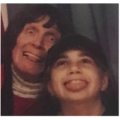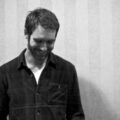A Song Sung to Whoever I Am: Ron Slate’s Joy Ride

Ron Slate’s much awaited third volume of poetry, Joy Ride resonates with personal alienation, historical memory rooted in the Holocaust, mortality and decay, but also reaffirms the transcendent importance of art in opposition to literal objectification.
In “Vigil”—just one of the poems in which the poet keeps a vigil beside a dying or dead person—the speaker is left alone with the body of his misanthropic cousin, following a ritual in Judaism that is intended to pay respect to the dead. In Slate’s recreation of the practice, the living must, ironically, still regard the “feelings” of the dead: “they took away my navel orange and bottle of water / since to chew and swallow were acts now impossible for the body, / offensive to its state in bardo.” Or “During the vigil, it is forbidden to fulfill a commandment / again, to avoid insulting the limited range of the dead.” This “elegy,” which opens and closes on religious skepticism, details the contradictions exposed by the cousin’s lawyers sorting through his items, and his apparent bigotry and anti-Socialist rhetoric refuted by evidence that “he practiced his dentistry two nights a week at a community clinic.”
There was more to the man than the speaker thought, and in the final stanza, Slate’s understatement is all the more powerful: “At one point in the vigil, I nodded off, then a hand shook me roughly by the shoulder.”/ How many years ago did I turn my face away from him?” There is authentic pathos here, a realization that a life is not a motto that stagnates, it is an ongoing process where mysteries prevail.
Slate is interested in the deep structures of the ego while acknowledging that the ego’s objective is to create a convincing enough “face” that can play at being someone other than who he actually is. Our self-representations emerge through a perspective of the world in which we recognize others as others and ourselves according to them. As self-identity evolves, there are successive re-integrations of temporarily confused selves that appear in an ensemble of roles that also receive social recognition. These poems suggest an episodic self—hesitant, hurried, perplexed, and sometimes, in his elegies, speechless.
Divided into two sections, the poet uses travel as an allegory for the self’s search for its other half, its missing link to an archival past by traveling to the European continent in order to annotate his ancestry including his mother’s family, who were hidden during the Nazi occupation of France. What compels Slate is less what happened, than what did not happen. His family was not discovered. They survived. But between those two coordinates is a lacuna to be filled . “At Sardent,” is one of the strongest poems in the volume:
I traveled to a place because something happened there or failed to happen, my mother didn’t die as a child, she wasn’t carried off, the family hid for five years though few stories are told because so little occurred. . . The present used to be a turnstile from past to future, but now the moment is employed to say no that was what happened… millions of versions beyond grasp and control, deleted and rewritten.
Marianne Hirsch defines “postmemory” as the experience of those who grow up dominated by the Holocaust and other traumatic narratives that have preceded their birth. These stories need not have been truly articulated by previous generations in order to make a psychic imprint on a child, who then struggles with ambivalent identifications with the victims. By conceiving of one’s self as multiple overlapping of the same, previous, and subsequent generations, postmemory can serve as a model of compassionate remembering. In Joy Ride, there is a conspicuous application of multiple perspectives, breaking with conventions of realism and introducing doubt as the necessary disclosure of an untruth.
A return to Sardent as the descendent of the family victimized by the Nazis, would have offered the poet entry into the hidden past. As he writes: “I traveled to a place to watch history / vanish, the silence between the stone houses smelled like baked stone, / lily stalks were studded with corms ready for picking…” The paradox is that by traveling to the place where something historical had happened and by revivifying narratives that stayed present in the poet’s imagination, that history vanishes into the present scene where reality and story intersect. In some ways, the village seems unchanged: the same flora returns and life continues simultaneous with the past. After describing the scenic streets that have been modernized, the “cracked war memorial” ultimately reveals its brutality and carnage. More vividly, the poet documents a particular event:
Then back to the square and its riddled wall telling what passed through the bodies of the executed. I stuck my fingertips into the holes, there was a surge of excess time swirling around the fountain. Those ancient tales of life on earth ending forever? There’s love for a world with limits.
Low key, quiescent, unembellished, the speaker guides the reader to the fate of their own conclusion. Postmemory seeks concrete evidence that will confirm for him the lot of the villagers who were executed there. Only the imagination can seize on the “excess time” that goes beyond the limits of testimonial accounts: a memory that speaks to its own excess, a kind of exteriority rendered in the image of the fountain that overflows and is constantly renewed. His mother’s voice, one that speaks that history is oddly censorious of the poet’s words and actions. For her, the traumatic past is now repressed, and she sees nothing to be gained by going to Sardent since the past is incontrovertible: “Why do you want to go there / asked my mother…” While the poet himself is proof of surviving Hitler’s plan to wipe out all of Eastern Europe Jewry, he can go only so far with the truth; there is a limit to understanding his mother’s pain, and her pain has limited her love. The presence of the mother’s voice haunts many of these poems. The poem concludes with the lack of resolution to the limits of ever understanding the enormity of genocide.
Nearer to his own self but no less incomprehensible is the obdurate agony of loss. In the poem, “Brother / ICU,” the speaker is at his brother’s bedside recounting their combative relationship through a memory of his brother (assumably younger and more of a follower) appeasing him with a gift that the speaker imagines, or in fact, throws against the wall: “What made him sullen made me savage.” His next association is far more specific: “The last gift was a memoir of the Great War.” For eleven days, his only sibling hovers between life and death, mirrored by the memoir in which a German soldier crosses enemy lines in order to spy by “overhear[ing] the talk” of the enemy. This emphasis on listening and silence, the apprehension of a sound that is never heard encapsulates Slate’s feeling of being cut off in vigil—when faced with death, where one listens for the breath, a hesitation, just as the speaker [the spy] listens for a word. The speaker then recalls an early memory of the brother and him playing a game of entering and returning the way that the soldier would, bringing back something vital—his brother, the appeaser, “the loyal quarter-light followed me.” For the survivor, the final gesture is one of acquiescence, even awe. At the end, the relatively detached speaker gives way to regret, now addressed to his brother:
In those fields of filled-in trenches, the place quivers with departed life because one stands there almost thoughtlessly. I crawled back as if I wanted to tell you.
Throughout Joy Ride, Slate’s postmodern perspective allows for inconsistencies in language, fragmentation of form, and self-reflexivity, investigating stable truths while disarming them through a process of unfolding revelation, but the line between fiction and truth is often crossed. By departing from the notion that a life is composed as a continuous narrative in which the postulated self is consistent throughout, Slate’s version of the collaged, or episodic, self exists in the moment—unconcerned with whether his life is composed of a whole or a collection of parts. While elegiac evocation of the past dominates the book, there are also extemporaneous moments, as in the poem “Between the Bed and the Window,” partaking from half-remembered bits of information and memories, such as the dustcover of the novel that gets knocked off the of the nightstand:
And just as you can get lost among imaginary people living in Peru, you may risk losing your hold on the world when bearing down faithfully on the objects between the bed and the window, in fact you might disappear, like the child who wandered far all the way to the shipyard.
The poem takes him into a deeper and more nuanced understanding of the fictive self, writing his way into being. Most postmodernist thinkers consider personal identity to be a constructed narrative, shaped by social and political forces so that the notion of an individuated self is never fully contained.
The title poem, “Joy Ride,” is a folly of a poem. Its dramatic seed is Slate’s depiction of sometimes unsettling family conflicts, misunderstandings, and painful resolutions— and he plays all the roles: the driver in the getaway car, and the recipient of all the colliding sensations permeating the air. This tour de’ force explores negative capability in a postmodern climate. It is also a signature poem, as he writes: “I’ve been so many persons and have carried them with me / from the beginning like some winged transport, de-iced / every morning and feeling upon waking as if someone / had been driving my car all night and tossed her trash / into the back seat while in dreams I eluded my enemies.”
The poems have a tendency to comment, in some cases quite judgmentally—which disrupts the amicability of the speaker in many cases. It may be the underside of his brilliance as an observer of human relationships and his bemused wit, which more than compensate for any harsh editorializing . Joy Ride reaches beyond Slate’s earlier, more distanced works, in which the poet rarely appears. These are poems that inspire us with poetry’s greatest gifts: the lilt of language and the force of wisdom. In the final analysis, it is Slate himself, and us, who assesses the magic of art once “embodied in a radio song sung to whomever I am.” Indeed, to be changeable is to be unpredictable and free; and to be not just the protagonist of one’s life story but the creator of its plot.
About Judith Harris
Judith Harris is the author of Atonement and The Bad Secret (LSU Press), Night Garden (Tiger Bark Press), and Signifying Pain (SUNY Press). Her poems have appeared in The Nation, The Atlantic, The New Republic, Slate, The Hudson Review, American Life in Poetry, and NPR. Her articles and reviews have appeared in AWP Chronicle, The American Journal of Psychoanalysis, On the Seawall, and Midwest Quarterly. A new book, The Poetry of Loss: Grief in Romantic and Contemporary Elegies. is due out with Routledge in 2023.





